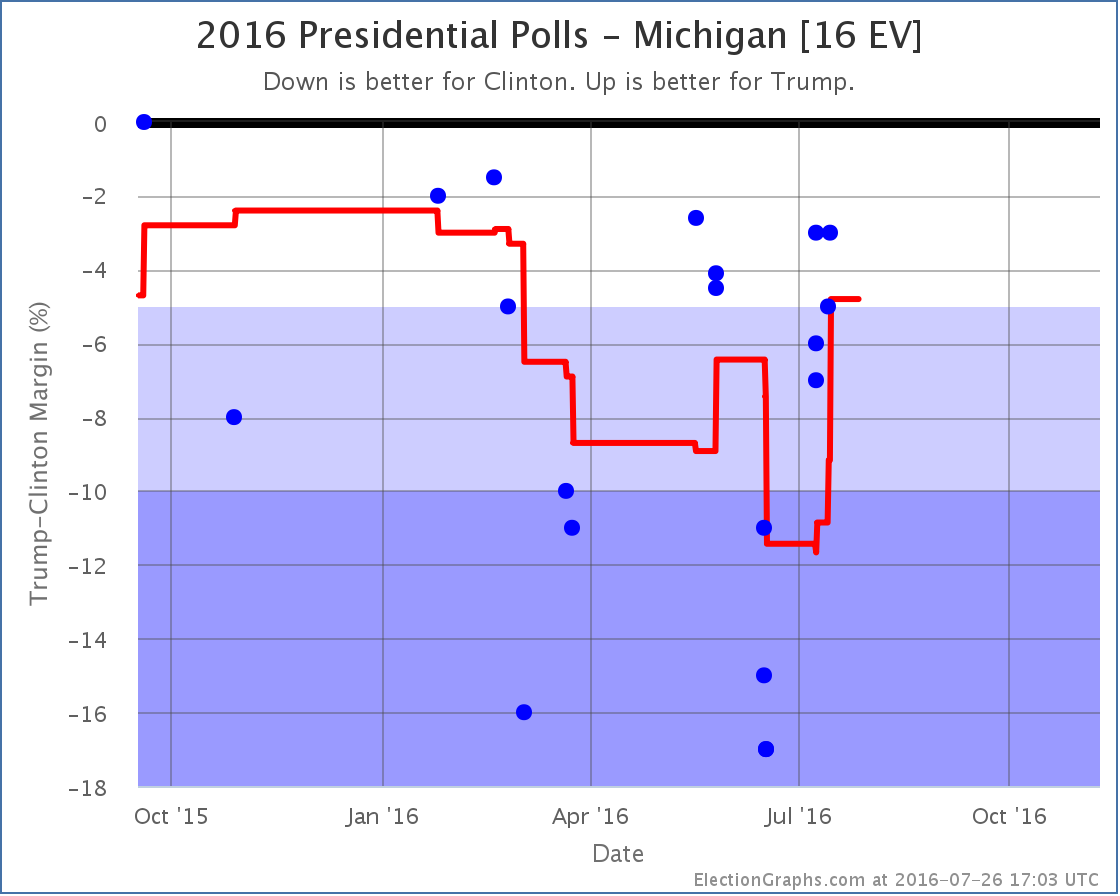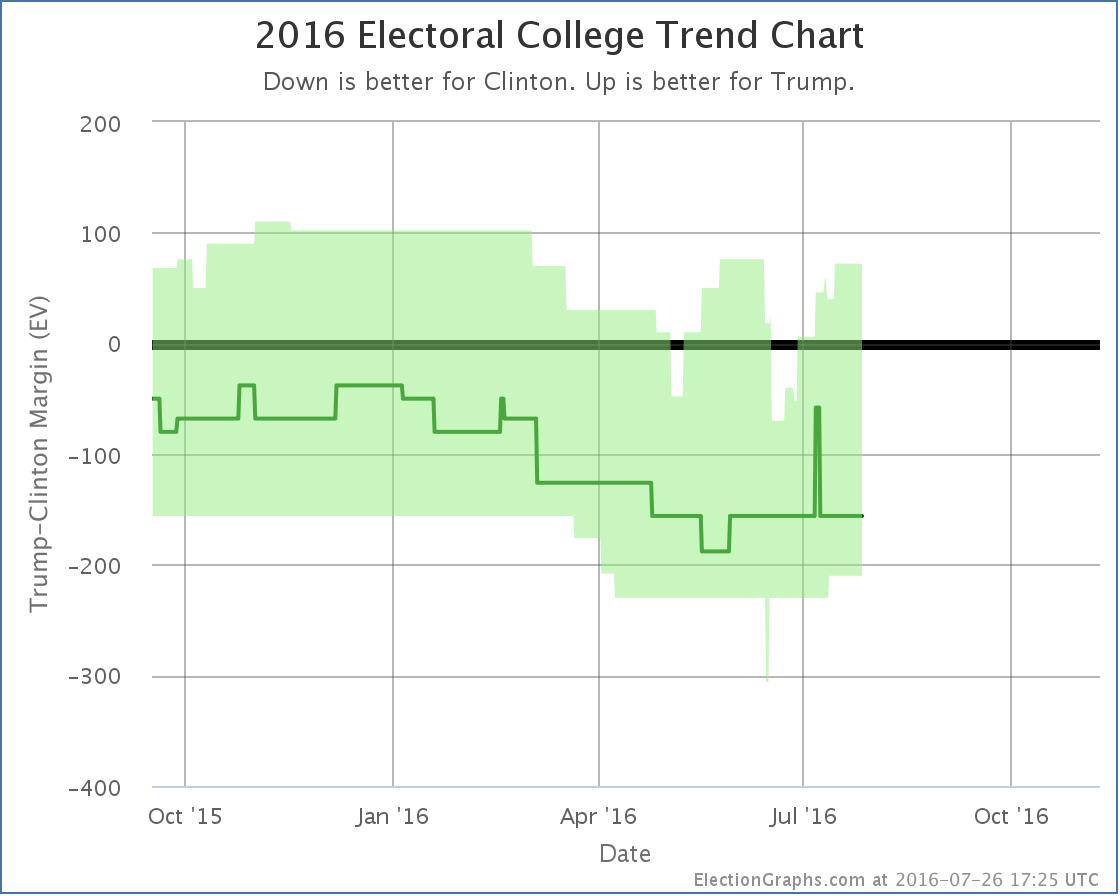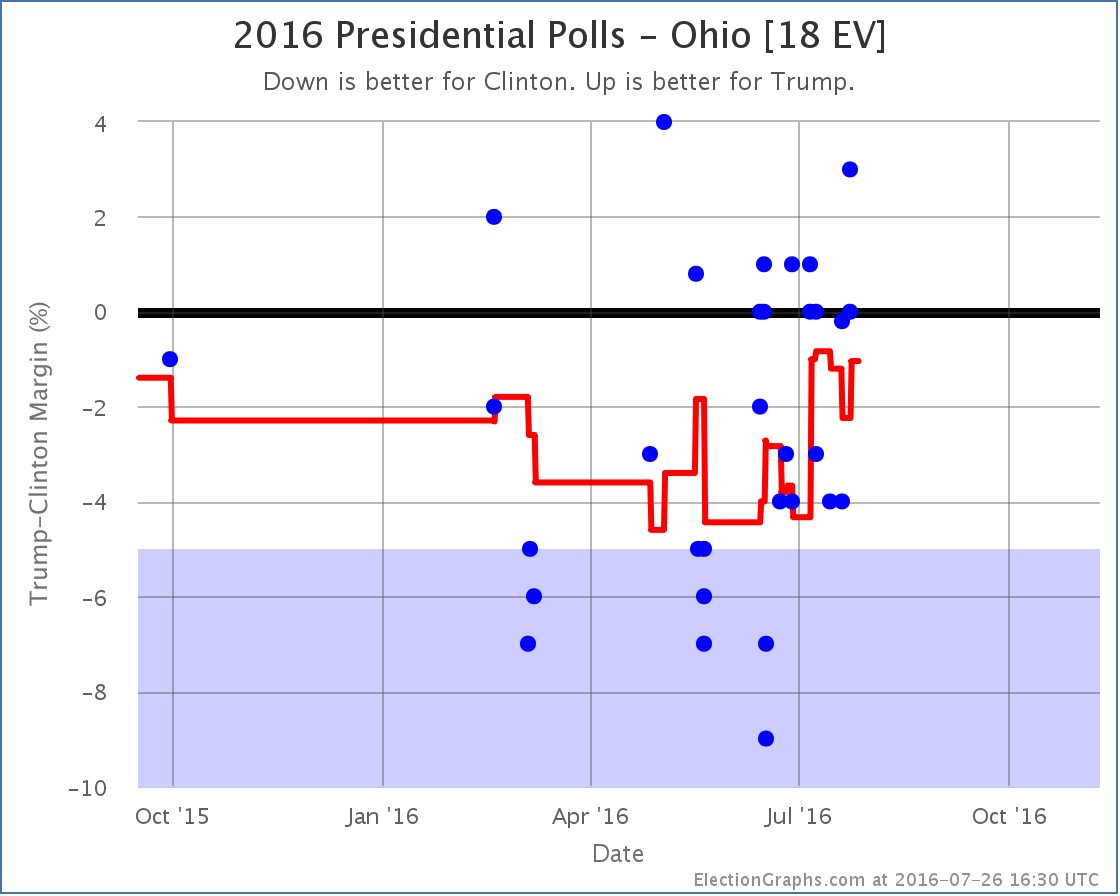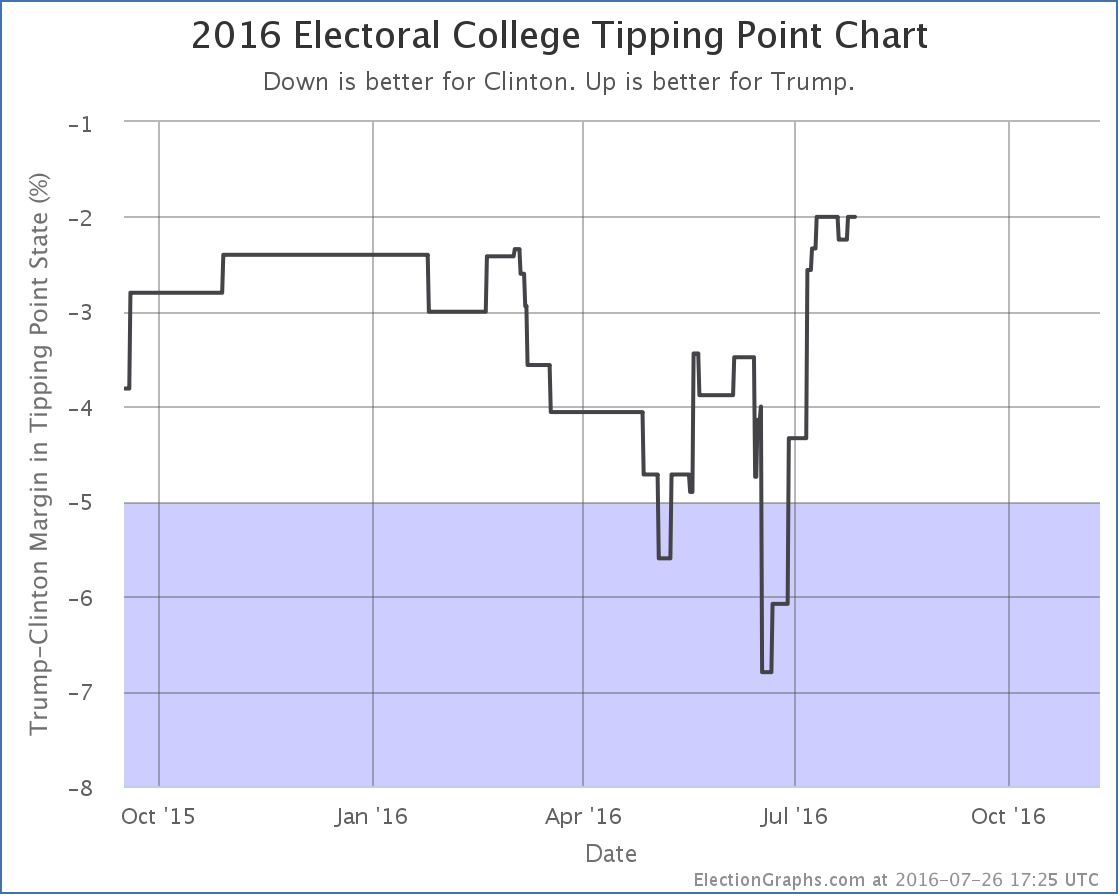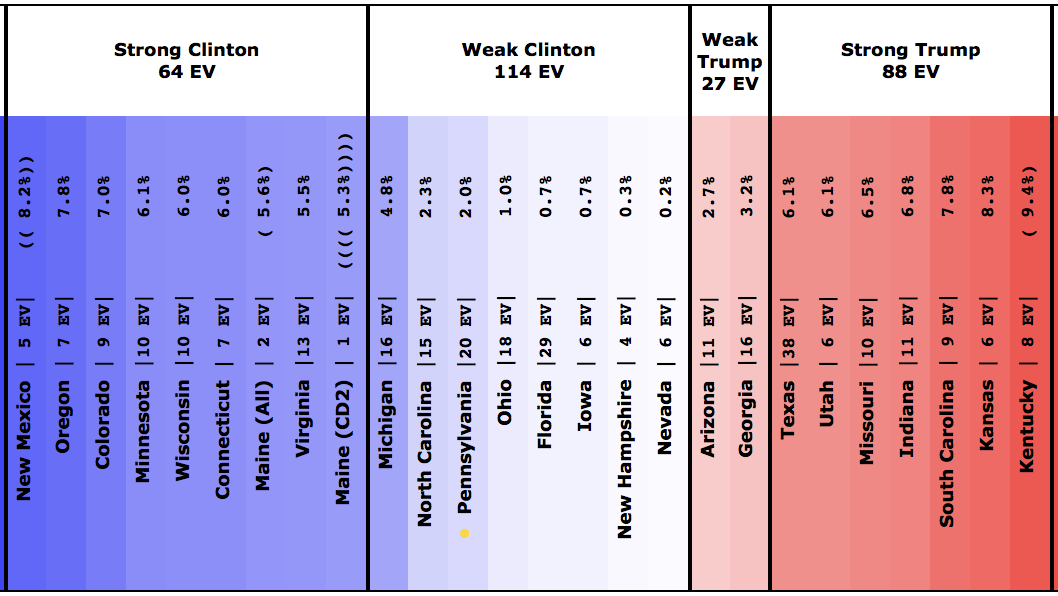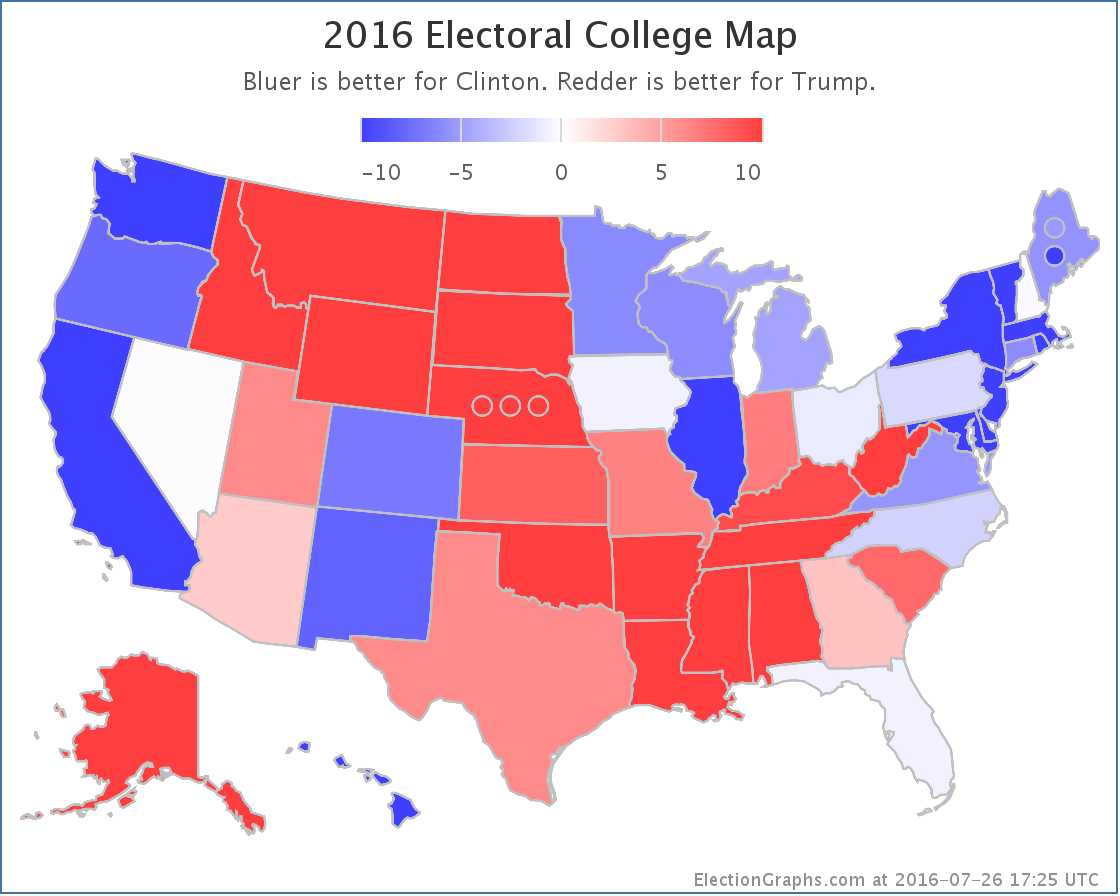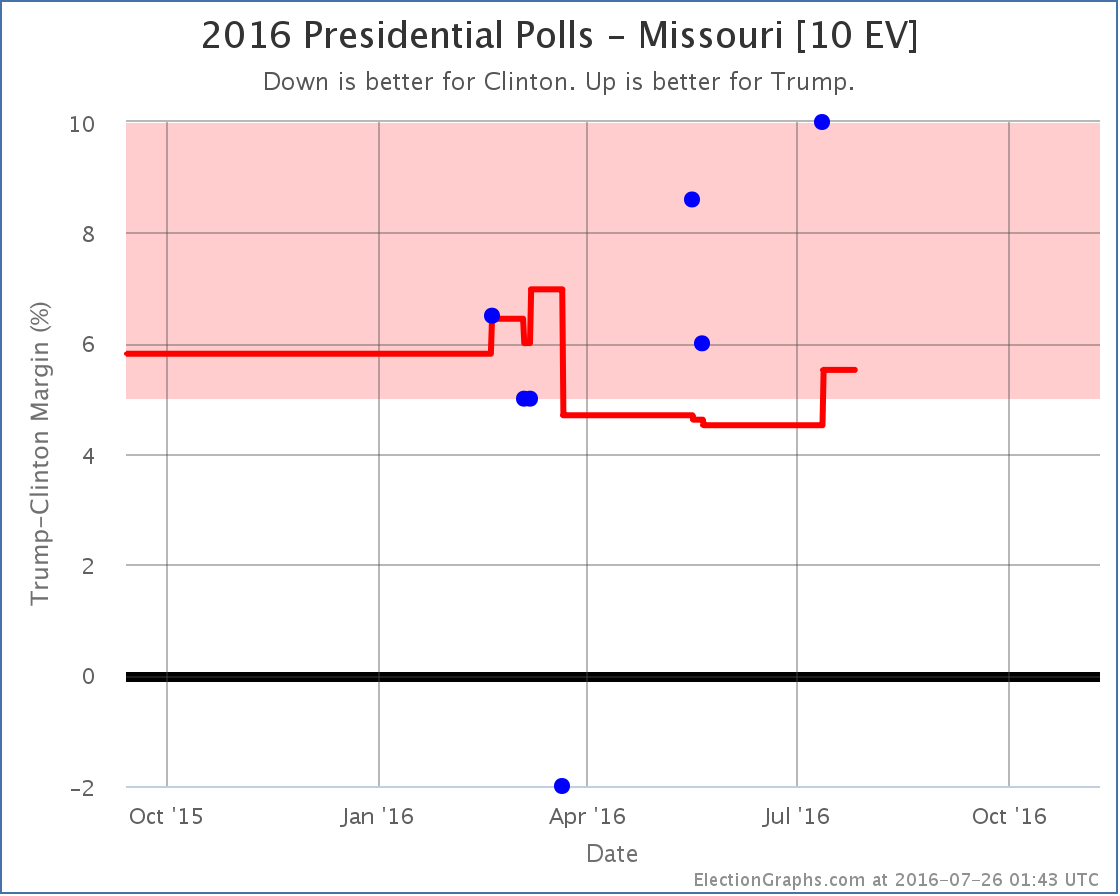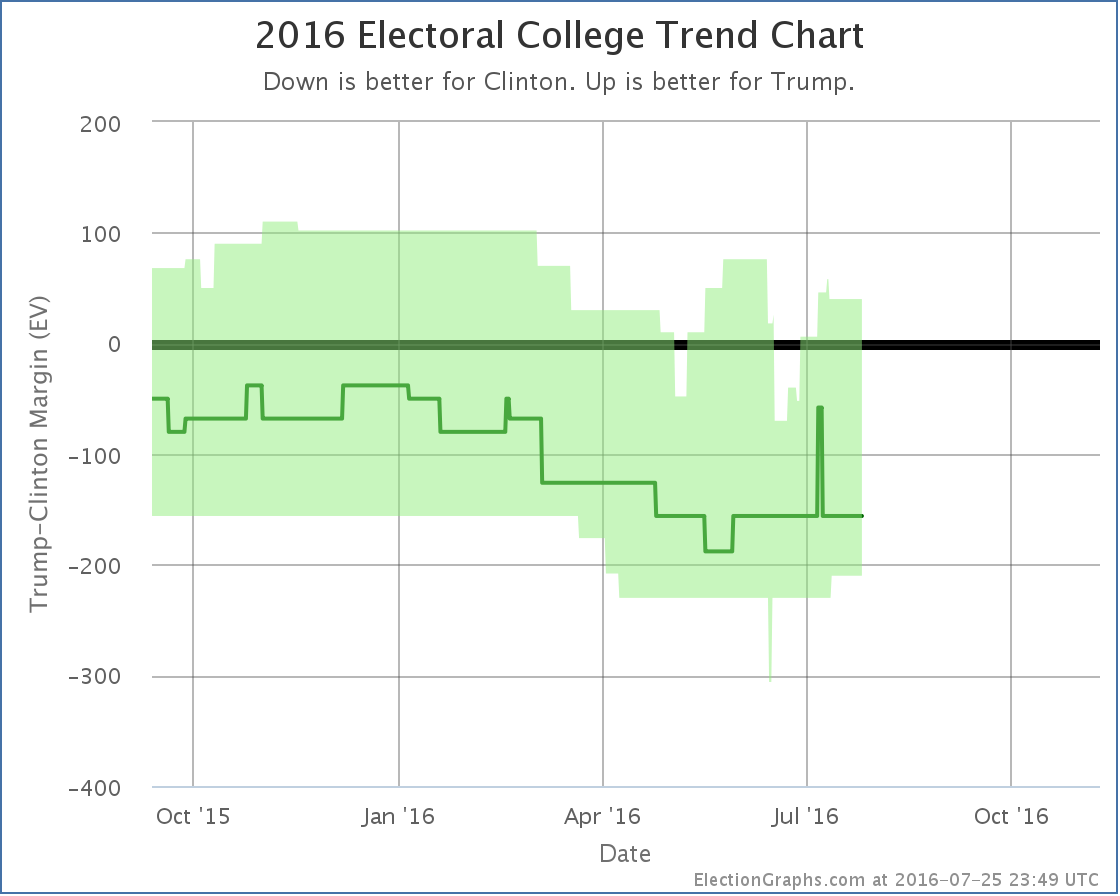- 00:04:50 Retweeted @ChrisWeigant 00:00:43 Is anyone else covering this? https://t.co/kd83VGd06i — "Breaking News — Bernie Delegates Storm Media Tents" #p2 #DemsInPhilly
- 01:12:17 Reading – My Quest to Find Jeb’s Delegates at the RNC (Seth Stevenson) https://t.co/KrXssIILj0
- 01:39:02 Dean scream! Excellent! #DNCinPHL
- 01:39:10 Retweeted @ForecasterEnten 01:39:03 Gotta give Dean credit. Takes a man to laugh at himself.
- 01:39:46 Retweeted @redsteeze 01:38:35 Every voter under the age of 30 is wondering what the hell just happened with Dean #DemsInPhilly
- 01:39:49 Retweeted @AlGiordano 01:38:44 Howard Dean parodies himself. A+
- 01:39:53 Retweeted @owillis 01:38:43 howard dean ftw
- 01:40:00 Retweeted @sadydoyle 01:38:40 "If he screams, I'm going to be so upset." – My mom, tensely watching the Dean moment
- 01:40:06 Retweeted @PeterWSJ 01:38:36 OK, Howard Dean, that was inspired.
- 01:40:39 Retweeted @ktumulty 01:38:47 Howard Dean reprises the scream, and it is awesome.
- 01:40:42 Retweeted @edbott 01:38:48 The scream!
- 01:42:09 Retweeted @CNBCnow 01:41:32 WATCH: Former Democratic presidential candidate Howard Dean re-creates infamous moment from the 2004 campaign https://t.co/qAdJ9MrZQ1
- 01:43:55 Retweeted @ElectionGraphs 01:35:03 Official Dem roll call results added: Clinton 2842, Sanders 1865, DNV 56 https://t.co/VCq2EHJXd7
- 01:43:58 Retweeted @ElectionGraphs 01:38:37 Compared 2 last Election Graphs estimates, Clinton gained 59.5 dels, Sanders lost 24.5 dels. Supers broke 2 Clinton. https://t.co/VCq2EHJXd7 in reply to ElectionGraphs
- 02:04:14 I basically missed Albright. Any memorable moments? #DNCinPHL
- 02:04:30 Bill coming up! #DNCinPHL
- 02:10:29 Bill is here. Lets see if he still has it. #DNCinPHL
- 02:11:16 He’s actually looking pretty good. Some of the other recent times I’ve seen him he’s seemed more ragged and older. #DNCinPHL
- 02:12:11 Retweeted @geoffreyvs 02:11:56 Bill and Hillary: The Love Story is how we start out with the Big Dog #DemConvention
- 02:12:32 Retweeted @mviser 02:12:25 “In the spring of 1971, I met a girl…” — Bill Clinton
- 02:13:18 Retweeted @fmanjoo 02:13:08 Are we sure this girl he’s talking about is Hillary?
- 02:14:11 Retweeted @pattonoswalt 02:11:12 Watch Bill's speech carefully, Donald. THIS is what an actual alpha dog looks & acts like. You overcompensating beta. #DemsInPhilly
- 02:14:27 Retweeted @mviser 02:14:18 “I’m Hillary Rodham, who are you?”
- 02:14:48 Retweeted @TheFix 02:14:42 Bill Clinton is reading off the teleprompter just like everybody else. He's just really good at it.
- 02:15:00 Retweeted @BuzzFeedAndrew 02:12:46 Kinda amazing Bill Clinton once looked like this: https://t.co/f4o9nOgb6d
- 02:15:54 Retweeted @greenfield64 02:14:59 Mr. Clinton does know how to tell a story, doesn't he? And if you're trying to humanize HRC, this is a pretty good way to do it.
- 02:17:16 Bill still has it. Doing good here. #DNCinPHL
- 02:19:10 Retweeted @nxthompson 02:18:47 Bill Clinton was the third youngest President; and he would be the oldest first spouse.
- 02:19:28 Retweeted @BuzzFeedAndrew 02:19:07 And this: https://t.co/BZH2Hu9Udw in reply to BuzzFeedAndrew
- 02:19:39 Retweeted @natsecHeather 02:19:15 Kiddies, note how @billclinton touched Alaska, Marion Wright Edelman, Minnesota and kids in, what, 45 seconds? oh, wait, Alabama too.
- 02:20:43 Retweeted @RobertsDan 02:18:24 Bill Clinton sounds like he's trying to make America fall in love with his wife the same way he did.
- 02:21:47 Retweeted @samsteinhp 02:19:07 It’s 10:18 and we’re just on the summer of ’72 #billclinton
- 02:21:59 Retweeted @geoffreyvs 02:21:54 He really is going to say every state. This is incredible. #DemConvention
- 02:24:54 I get the idea of this, but Bill is starting to lose me. I’m ready to skip forward a decade or two. #DNCinPHL
- 02:26:35 I’ve heard some of these stories before. Ready to fast forward. Many haven’t heard these of course. #DNCinPHL
- 02:26:53 Retweeted @jeneps 02:26:04 We're 15 minutes in, they just got married and it's the fall of 1975
- 02:27:07 Retweeted @ByronTau 02:12:27 The protesters outside the security perimeter want to burn an American flag but they can't seem to find one.
- 02:27:25 Retweeted @aedwardslevy 02:27:14 REVISED CONVENTION ADVISORY
Wednesday: Bill Clinton on the 1980s
Thursday: Bill Clinton on the 1990s - 02:27:35 Retweeted @mikiebarb 02:26:39 Bill is succeeding in putting a human face on a marriage that many find baffling.
- 02:28:23 Retweeted @MikeGrunwald 02:27:00 This speech is like Bill's autobiography, where he worked on the beginning and then the end is just a rushed dump of Nexis clips.
- 02:29:22 My Twitter feed is now 90% people making fun of how slowly Bill is passing through the decades. #DNCinPHL
- 02:30:23 He started out strong. Good personalization of Hillary. But really stretching out too long now. #DNCinPHL
- 02:30:40 Retweeted @brianbeutler 02:30:28 “Through the next 17 years, which takes us to the 1990s."
- 02:31:05 Retweeted @dandrezner 02:30:58 Just 36 more years to go, so Bill Clinton should be done by August 1st.
- 02:31:43 “Decades started to fly by.” Thank goodness! #DNCinPHL
- 02:32:14 Retweeted @trillballins 02:23:59 Clinton, hour 7: That SNL skit,that was crazy. They had me in that McDonalds, just eating during my run. Ha ha ha
- 02:32:29 Retweeted @sinderbrand 02:32:21 10:31 pm ET. We've reached 1982 — but now, "the years flew by." How many years? "In 1983…" in reply to sinderbrand
- 02:32:46 Retweeted @alexburnsNYT 02:32:38 I hope he does a 25-minute synopsis of his '88 convention speech
- 02:33:40 Hope he has something planned to rev people up at the end of this speech, because the middle is really dragging. #DNCinPHL
- 02:33:48 Retweeted @DavidCornDC 02:33:39 This is Bill Clinton's seminar on Hillary Clinton. The details are touching, but there are lots and lots of details. #DemsInPhilly
- 02:34:07 Retweeted @alyssaharad 02:17:28 It his job to humanize her and that's what he's doing. We know this is the job of political spouses, we just never see the men do it. in reply to alyssaharad
- 02:34:47 Retweeted @imbou 02:34:33 @abulsme it's been moving better now I was thinking the same that it was taking long, but i feel he's getting it rolling now in reply to abulsme
- 02:35:30 Pounding the podium! Here we go again! Speeding up again? #DNCinPHL
- 02:35:44 Retweeted @sadydoyle 02:35:35 Bill, 573 hours into his detailed second-by-second play-by-play of his marriage, realizes he has a point and pounces on it like a hyena
- 02:37:36 Retweeted @kairyssdal 02:37:26 What year are we in? Lost track.
- 02:37:44 .@kairyssdal 1997 in reply to kairyssdal
- 02:38:58 Retweeted @WNYC 02:38:45 Fact: The Clintons are 1st married couple to have both been nominated by the Democratic party–or any party–to become POTUS. #DemsInPhilly
- 02:39:19 Retweeted @SteveKopack 02:39:07 Bill Clinton out of context: "there i was, in a trance, just staring out the window"
- 02:40:30 This is still too long for the material. Ready for something different. #DNCinPHL
- 02:40:48 Retweeted @FiveThirtyEight 02:38:50 Something like one in seven voting-age adults wasn’t born when Bill Clinton was elected to office: https://t.co/ICSBkizaKr #DemConvention
- 02:40:55 Retweeted @metapostasy 02:39:35 One in seven voting-age adults wasn't born when this speech started. https://t.co/oS5wMhUrKE
- 02:42:02 Every once in awhile he gets to an interesting point and people clap. In between, this is really dragging. #DNCinPHL
- 02:42:24 Maybe it seems different to people who don’t know lots of this history? #DNCinPHL
- 02:43:38 Retweeted @intelwire 02:43:25 New Dem strategy: Bill just going to keep talking until Trump's term as president is over.
- 02:43:54 Retweeted @jbarro 02:43:39 The genius of this speech is it does both at once: humanize Hillary and ground her ideological agenda. https://t.co/Ud8wuNpNHM
- 02:44:09 Retweeted @imbou 02:43:58 @abulsme I don't feel it's dragging that much I mean in 10 minutes he fast forwarded 25 years in reply to abulsme
- 02:44:25 .@imbou Bored now. #DNCinPHL in reply to imbou
- 02:44:49 Retweeted @SwiftOnSecurity 02:44:41 Wow, Hillary's husband is a great public speaker. Kind of like a male Michelle Obama. He might have a future in politics.
- 02:45:47 Retweeted @petridishes 02:44:27 i feel that not enough time in this speech was devoted to Socks
- 02:45:59 Retweeted @EdEspinoza 02:45:52 By laying out Hillary's decades of service biography, Bill is drawing a sharp contrast to Trump's total lack of experience. #DemsInPhilly
- 02:46:09 Retweeted @moneyries 02:40:48 Bill Clinton is pre-viral. This speech is warm but so far no real big moments I see popping on the Facebooks.
- 02:46:55 Now he compares this history to Trump. Nice touch. Getting to the point finally. #DNCinPHL
- 02:47:11 Retweeted @NYMag 02:41:57 Andrew Sullivan on Bill Clinton making a case for Hillary's long career in public life: https://t.co/XNIPvDpFqd https://t.co/igbbDD1fqK
- 02:48:08 Retweeted @robertwrighter 02:47:59 This transition from heartwarming Hillary biopic to GOP-trashing (and, I hope, Trump-trashing) is masterful.
- 02:48:36 Things getting more interesting now that Clinton has pivoted out of the biography. #DNCinPHL
- 02:48:44 Retweeted @imbou 02:48:20 @abulsme I think it is totally because you knew most of it in reply to abulsme
- 02:49:30 Retweeted @mmurraypolitics 02:49:04 Bill: "Earlier today, you nominated the real [Hillary]" — not the one Republicans describe, he said
- 02:49:45 Looping back to the beginning. Must be wrapping up. #DNCinPHL
- 02:51:34 Retweeted @MichaelSteele 02:15:47 There are no words. https://t.co/uPa563upar
- 02:51:43 Retweeted @natsecHeather 02:51:34 "Real 1 calls you when your kid's in trouble" says @billclinton. 4ever grateful to @HillaryClinton team when my baby was sick, @neeratanden
- 02:52:19 Retweeted @imbou 02:52:11 @abulsme he's cooking now in reply to abulsme
- 02:52:29 Retweeted @TeeMcSee 02:51:56 This is all off prompter from Clinton. It stopped when he started telling about the WEST Virginia trip.
- 02:53:10 Retweeted @NPRinskeep 02:32:23 A long speech, though its purpose is clear: he's painting an extended portrait of a human being, who's often talked about as if she isn't.
- 02:53:29 Retweeted @ZekeJMiller 02:53:10 Clinton ad-libbed that closing. Prompter had stopped rolling for a couple of minutes
- 02:54:08 Strong beginning, strong end. Weak in the middle. But basically classic Bill. #DNCinPHL
- 02:54:12 Retweeted @aravosis 02:54:05 CNN’s Jake Tapper on Bill Clinton: “He still has it.”
- 02:54:57 Retweeted @ForecasterEnten 02:54:40 Wait. This is still going on?
- 02:55:39 Uh, what’s with this song? #DNCinPHL
- 02:56:07 OK, it is getting a bit better. #DNCinPHL
- 02:57:37 Retweeted @JesseFFerguson 02:57:28 WATCH THIS. New Version of "Fight Song" – Pitch Perfect. Playing now. https://t.co/OaMEkKKdJo
- 02:58:32 Retweeted @ellievhall 02:53:32 BILL CLINTON SPEECH TIME: 42:11:22
- 02:58:38 Retweeted @petridishes 02:58:21 DNC 2016 Smooth Jams
- 02:59:14 Retweeted @ezraklein 02:58:30 My favorite moment of either convention so far. If you weren't moved by this, you're missing a part: https://t.co/Xu5lWu1eQz
- 02:59:32 Retweeted @teenagesleuth 02:25:41 Remind me again, how many former Presidents spoke at the RNC Convention?
- 02:59:46 Retweeted @brianstelter 02:57:36 Hillary about to appear at the convention via satellite from New York…
- 03:00:42 Retweeted @RaniaKhalek 03:00:26 Bernie Sander delegates told me DNC reps keep tearing down their "I support Palestinian human rights" signs bc they're not DNC approved.
- 03:01:38 Retweeted @redsteeze 02:59:35 Meryl Streep is who the media wishes Hillary Clinton actually was #DemsInPhilly
- 03:02:23 Retweeted @ndrew_lawrence 02:55:09 That was pretty good but it was missing the whole "yelling at me about probably getting murdered tomorrow" vibe of the RNC speakers
- 03:03:59 Retweeted @jimantle 03:00:20 If nothing else, Bill Clinton remains a beloved figure in Democratic circles despite the fact his triangulation is no longer popular.
- 03:05:14 Retweeted @fmanjoo 02:29:14 Hearing that the presidential nominee’s “water broke” is both normal and completely revolutionary.
- 03:06:48 Musical interlude = bathroom break. #DNCinPHL
- 03:10:41 I gotta leave to pick up my mom at the airport in about half an hour, lets wrap this up… :-) #DNCinPHL
- 03:13:03 Montage of presidents so far, followed by Clinton breaking glass. Nice. #DNCinPHL
- 03:14:13 “Biggest crack in that glass ceiling yet” #DNCinPHL
- 03:14:58 Retweeted @TeddyDavisCNN 03:14:51 Hillary Clinton to little girls watching: "I may become the first woman president — but one of you is next." https://t.co/TEy6F5ZzCo
- 03:15:17 Retweeted @nycsouthpaw 03:15:10 little did you know that the glass ceiling is Barack Obama's FACE.
- 03:18:17 I’ve never been a Hillary Clinton fan, but the contrast with Trump is just so stark. Positive vs Negative. #DNCinPHL
- 03:18:52 Recess! Forgot gavel! Just like the other day! #DNCinPHL
- 03:19:05 Now gotta go to the airport…
- 03:19:26 Retweeted @THELuisAMendez 03:19:00 Dude, I'm a Righty. The DNC is soooooo much more positive than the RNC was https://t.co/mku3aBesfK
- 03:40:28 Retweeted @jpitney 03:21:12 What aging pundits overlook about @billclinton's stories: many voters under 35 have never heard them before.
- 03:56:25 Retweeted @rezaaslan 03:53:08 Presidents 42 and 45 y'all. https://t.co/dcMhu11f7X
- 05:16:11 Retweeted @aedwardslevy 03:12:53 Pretty sure this is the first convention in a while to prominently feature a portrait of Millard Fillmore
- 05:17:42 Retweeted @EWErickson 02:19:25 Republicans can mock the Clintons, but they stayed together and the GOP candidate is on wife number 3. Yay party of family values.
- 07:10:44 Retweeted @jenstatsky 05:55:45 This is an actual sentence on the "Issues" page of Trump's website. It literally looks like a 3rd grade book report. https://t.co/wfdjNATOK2
- 07:11:22 Retweeted @GoldyHA 07:05:20 Not sure what Nate Silver's smoking, but @hominidviews has @HillaryClinton with a 97% chance
https://t.co/j00XHEsI9o https://t.co/Lulg6IUxxY - 07:12:15 .@GoldyHA @hominidviews @HillaryClinton Lots of weight on national polls over state polls maybe? in reply to GoldyHA
- 07:20:58 Retweeted @becket 06:43:21 President Clinton addresses staff at massive party in Reading Terminal after DNC speech #DemsInPhilly https://t.co/srTC0o9WJG
- 14:01:17 Retweeted @bentaub91 13:51:38 Eight years ago, for the DNC, @SenJohnMcCain recorded this classy message for @BarackObama. Different world. https://t.co/FZ8ndPmup5
- 14:33:15 Retweeted @DanaSchwartzzz 04:16:34 Before voting for Donald Trump, I would vote for any random citizen who was told the day of and just promised to do their best
- 14:39:22 Perfect -> Bill Clinton’s speech, translated (@petridishes) https://t.co/Xl4PLToLmQ
- 15:55:29 Retweeted @FoxNews 15:15:54 .@realDonaldTrump: "Russia, if you're listening, I hope you're able to find the 30,000 emails that are missing." https://t.co/Xr4of6hpqJ
- 15:56:10 Retweeted @maggieNYT 15:52:30 The Mike Pence mop-up squad moves in after the spill https://t.co/hn41cQjFSH
- 15:58:34 Retweeted @FranklinFoer 15:26:33 Week in Review 1)Trump shifts platform 2)Trump dumps on Nato 3)Russia tries to ruin Dem unity 4)Trump blesses Russian spying on his enemies.
- 16:00:22 Retweeted @Taniel 15:50:08 Has any prominent GOP official who doesn't back Trump said they back someone else (Clinton/Johnson)? If they're serious, can't go half-way.
- 16:00:40 Retweeted @jbarro 15:50:08 Trump said, at least three separate times in the presser, that he hopes hostile governments have Hillary's emails. He was not joking! in reply to jbarro
- 16:01:09 Retweeted @DanRiehl 15:49:11 Psst: Trump is sucking the air out of the room right now better hold off a bit. https://t.co/kLrIVF2wsN
- 16:01:28 Retweeted @BilgeEbiri 15:38:38 Oh dear god. He thinks Tim Kaine is Tom Kean. https://t.co/jbWqoAQH3K
- 16:02:30 Retweeted @dandrezner 15:08:47 Imagine Hillary Clinton calling on a foreign power to help sabotage Donald Trump's campaign. Then you'll realize how batshit-crazy this is. in reply to dandrezner
- 16:03:48 Retweeted @Vilkomerson 15:28:06 This wikipedia entry on Socks Clinton is one of the saddest short stories I've ever read. https://t.co/C8zXLe8uRe
- 16:45:49 Retweeted @jamesbdwyer 16:38:27 Imagine if @HillaryClinton openly called on hackers to hack the IRS to release Trump's tax returns & the total shit storm that would ensue.
- 16:49:30 Retweeted @stuartpstevens 16:22:10 Role of Gov. Pence is to reassure those who know that Trump is dangerous & unqualified that it might still work. But of course it won't.
- 16:50:47 Retweeted @Phil_Mattingly 16:22:16 Shortly after Pence puts out a clean up statement of sorts, Trump doubles down: https://t.co/nM7f57mYJV
- 16:50:55 Retweeted @NoahCRothman 16:40:08 Sweet lord almighty. How much evidence to you people need!? https://t.co/ZuCBBh8d51
- 17:02:28 Retweeted @owillis 16:36:18 back in the old days they had a thing they used to call a "useful idiot"
- 18:21:36 Reading – How Donald Trump Broke The Conservative Movement (And My Heart) [Katherine Miller] https://t.co/rxZjhFh157
- 19:01:34 Nice turnabout -> Clinton’s husband wore a fetching pantsuit to honor her nomination for US president (Jenni Avins) https://t.co/QVC2Z75IKS
- 19:11:09 Retweeted @Noahpinion 18:59:45 We might be about to elect Donald Trump president. But here is a picture of a cat playing with a rabbit. https://t.co/tRl79kjRWk
- 19:38:57 Retweeted @DivertimentoNo1 16:27:15 At what point do Republicans panic at the horrible and very belated realization that they've nominated a madman? Asking for a friend.
- 20:21:57 Retweeted @TheRickWilson 18:37:50 Just in case you haven't had your fill of absurdity today, let's not forget there's a Trump @reddit AMA tonight. What could go wrong?
States with new poll data since the last update: Georgia, Ohio, Nevada, Michigan, Missouri, New Hampshire, Kansas. The quick answer to the question in the subject of this post is “not yet”, at least in terms of what can be detected in state poll averages like we track here. Plenty has been written elsewhere on the Trump bump in national polling averages such as Pollster and RCP. There does appear to be a bump after the Republican convention. It takes a lot longer for these effects to show up at the state level, so we are unlikely to see individual effects for the two conventions. Instead we’ll see the net effect after both. In the meantime, there are indeed two changes from the latest batch of polls, and they both are in Trump’s direction. In one case the data is from before the convention, and in the other the movement is small, so it isn’t enough to call out as a bump yet. Looking at them individually: Michigan Even though one poll was just added, the most recent poll in Michigan is still from before the Republican convention, so we can’t read anything about a bump into it. But it did cause some polls that were very favorable to Clinton to roll off the poll average, so the average spikes up in Trump’s direction. There haven’t been any polls actually showing Trump ahead in Michigan in almost a year, but with this Clinton’s lead drops to 4.8%, so we consider it a potential pickup for Trump. Trump’s best case moves from winning by 40 electoral votes to winning by 72 electoral votes. To get there he still has to flip Nevada, New Hampshire, Iowa, Florida, Ohio, Pennsylvania, North Carolina and Michigan. Clinton is still ahead in all of those states, but by less than 5%. The “expected” result where everybody wins the states they are ahead in is still a 156 electoral vote victory for Clinton. But Trump doesn’t need to flip ALL of those states to win, only some of them. How close is he really? That is where Ohio and the tipping point come in… Ohio New results from PPP, which ARE from after the Republican convention move the average from a 2.2% Clinton lead in Ohio to a 1.0% lead. Either way, the state is “Weak Clinton”, but because Ohio was the tipping point, this impacts the tipping point: The tipping point moves from Clinton by 2.2% in Ohio to Clinton by 2.0% in Pennsylvania… so back to where it was right before the Republican National Convention started. National View Looking at the center part of spectrum of states… only those where the margin is under 10%, we now have this: And the map: That is a lot of close or almost close states. 105.2 days until polls start to close on election day 2016. Note: This post is an update based on the data on ElectionGraphs.com. Election Graphs tracks both a poll based estimate of the Electoral College and a numbers based look at the Delegate Races. All of the charts and graphs seen in this post are from that site. Additional graphs, charts and raw data can be found there. Follow @ElectionGraphs on Twitter or like Election Graphs on Facebook to see announcements of updates or to join the conversation. For those interested in individual general election poll updates, follow @ElecCollPolls on Twitter for all the polls as they are added. If you find the information in these posts interesting or useful, please consider visiting the tip jar. States with new poll data since the last update: New Hampshire, Alabama, Illinois, Alaska, Arkansas, Arizona, California, Colorado, Connecticut, DC, District of Columbia, Delaware, Florida, Georgia, Hawaii, Iowa, Idaho, Indiana, Kansas, Kentucky, Louisiana, Massachusetts, Maryland, Maine, Michigan, Minnesota, Missouri, Mississippi, Montana, North Carolina, North Dakota, Nebraska, New Jersey, New Mexico, Nevada, New York, Ohio, Oklahoma, Oregon, Pennsylvania, Rhode Island, South Carolina, South Dakota, Tennessee, Texas, Utah, Virginia, Vermont, Washington, Wisconsin, West Virginia, Wyoming. In addition to a handful of new polls, this batch of updates includes two sets of 50 states plus DC data from Morning Consult, one released in April covering January through March (with multiple candidate pairs), and another released in July covering April through June (covering only Clinton vs Trump). These span really long time periods and use a slightly different methodology than other polls, so I had initially not included them. But I was convinced by @hominidviews that I actually should include them, so they are now folded into the data. In most cases, since the middates of the polling periods are fairly far in the past at this point, the addition of these polls only jiggled the lines around in the past rather than changing the situation as of today. Even in the sparsely polled states where these polls did change the average, categories did not generally change. The one exception for Clinton vs Trump was Missouri: Missouri With the new Morning Consult poll centered in May added, the July PPP poll was enough to end Missouri’s time as a close state that was caused by a March DFM poll that now looks like a pretty clear outlier. So Missouri moves from “Weak Trump” to “Strong Trump” and it is therefore no longer listed as a possible pickup for Clinton. Back in the past, you can see a few new features added by the Morning Consult polls… a dip in the expected line for a little while in May where Clinton briefly was in the lead in Georgia, and a spike in Clinton’s best case where she got within 5% in Texas… for one day. The only change that hasn’t already come and gone is the change in Missouri. Clinton’s best case goes from winning by 230 electoral votes down to winning by 210. Note this is not part of any “convention bump”. This change is due to poll information from before the convention. There should be new polls added soon that will tell us more about the impact of the conventions. This is not that. Oh, and the Morning Consult data had some Clinton vs Cruz information as well. Since that combination is still one of the five best polled combinations, even though Cruz lost, I’ll note the changes: Kentucky went from Strong Cruz to Weak Cruz, and Minnesota went from Strong Clinton to Weak Clinton. So Clinton’s best case moved from winning by 188 to winning by 204, and Cruz’s best case went from winning by 30 to winning by 50. Note: This post is an update based on the data on ElectionGraphs.com. Election Graphs tracks both a poll based estimate of the Electoral College and a numbers based look at the Delegate Races. All of the charts and graphs seen in this post are from that site. Additional graphs, charts and raw data can be found there. Follow @ElectionGraphs on Twitter or like Election Graphs on Facebook to see announcements of updates or to join the conversation. For those interested in individual general election poll updates, follow @ElecCollPolls on Twitter for all the polls as they are added. If you find the information in these posts interesting or useful, please consider visiting the tip jar.
|
||
